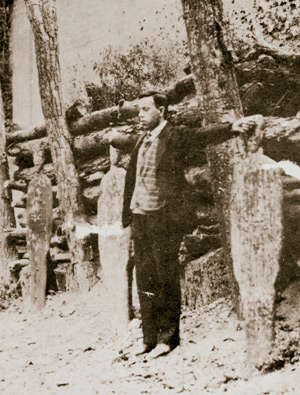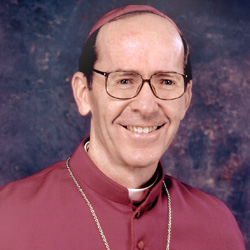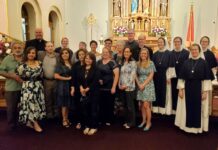Editor’s note: This is the first part in a series of columns by Bishop Thomas J. Olmsted that celebrated of the holy Year for Priests. It was originally published Oct. 1, 2009. Fr. Pro did not support the armed insurrection against the Mexican government’s anti-Catholic actions. Nonetheless, he was arrested and executed without trial.
The plan of the president of Mexico was simple: arrest Miguel Pro, bring him before the firing squad, watch him deny his faith in an attempt to save his life, then capture his cowardice on film and thereby disgrace the Church, especially its priests. That was the plan of the president, Plutarco Elias Calles. But as God says through the Prophet Isaiah (55:8-9), “For my thoughts are not your thoughts, nor are your ways my ways, says the Lord. As high as the heavens are above the earth, so high are my ways above your ways and my thoughts above your thoughts.”

The first step of the president’s plan seemed promising. Miguel, a Jesuit priest, was arrested along with his brothers Roberto and Humberto. They were taken to the Mexico City jail, locked in cells, and subjected to frequent questioning. Though unable to prove them guilty of crimes deserving capital punishment, President Calles ordered Padre Pro’s execution, together with his brother Humberto. Moreover, the president invited government officials, members of the press and photographers to be present for the execution to witness and to capture on film the spectacle of disgrace that he was certain was about to occur.
At 10 a.m. on Nov. 23, 1927, the prisoner was taken from his cell and led across the compound to the execution site. Even before he reached the place of his martyrdom, the plan began to unravel. As Padre Pro walked with his crucifix in one hand and a rosary in the other, one of the policemen who had helped to capture him a few days before broke ranks and approached him with tears, begging the priest to forgive him for his part in the ordeal. Reaching out to him as a brother, Padre Pro said, “Not only do I forgive you, I also give you thanks.”
Upon arrival at the wall of execution, the priest asked permission to pray before being executed. Being granted his wish, he knelt before the wall riddled with bullet holes from previous executions and, clasping the crucifix and the rosary next to his heart, he asked God for the grace of a holy death. Then, he rose, kissed the crucifix, extended his arms in the form of a cross and, facing the firing squad, declared: “May God have mercy on you. May God bless you. Lord, you know that I am innocent. With all my heart I forgive my enemies.” Finally, as the firing squad took aim, Padre Pro said in a calm and steady voice, “¡Viva Cristo Rey!” “Long live Christ the King!”
As the execution proceeded and he breathed his last breath, there was not a single expression of cowardice on his face, no fear or anger in his voice; there was only forgiveness and filial trust in God. The president’s plan had failed. Padre Pro was dead in his earthly body but he had triumphed over death. As St. Paul writes (1 Cor 15:54f), “Death is swallowed up in victory. Where, O death, is your victory? Where, O death, is your sting?” As the president received assurance of his death on earth, Blessed Miguel Pro was already rejoicing in heaven; and the story of his heroic witness was about to spread like wildfire across his homeland and to the ends of the earth.
 Padre Pro’s family collected his body, together with that of his brother Humberto who was executed after him. Their bodies, having been washed and laid out in coffins, were brought to the house of a friend, where, throughout the night, people came in ever increasing numbers to pay respect to this new priest-martyr. As the crowd expanded, the Blessed Sacrament was exposed on top of his coffin, a Holy Hour of Adoration was held, and then prayers continued until dawn.
Padre Pro’s family collected his body, together with that of his brother Humberto who was executed after him. Their bodies, having been washed and laid out in coffins, were brought to the house of a friend, where, throughout the night, people came in ever increasing numbers to pay respect to this new priest-martyr. As the crowd expanded, the Blessed Sacrament was exposed on top of his coffin, a Holy Hour of Adoration was held, and then prayers continued until dawn.
In the morning, as the funeral procession was about to begin, those wishing to pay their final respect had increased into a sizeable crowd, despite the threats of President Calles, who had forbidden any public demonstration of sympathy. More than 500 cars joined the procession to the cemetery. As it wound its way through the streets, flowers were thrown from balconies, thousands of people lined the sidewalks, and voices shouted, over and over, “¡Viva Nuestra Senora de Guadalupe! ¡Viva Cristo Rey!”
At the gates of the cemetery, brother priests of Mexico, despite the danger of being arrested and executed themselves, asked for the privilege of carrying the martyr’s body to the place of burial and of lowering it into the grave. The family graciously granted permission and, bearing the coffin together, they brought his body, and that of his brother Humberto, to their place of rest.
The plan of President Calles was in shambles. The Plan of God, on the other hand, moved full steam ahead. Despite the president’s order that the photographs not be published, they were printed and distributed across the country and indeed around the world. People who had never heard of Miguel Pro now admired him as a martyr. Within days, he had become the most popular priest in Mexico and he remains so even today.
What is more, what he accomplished in life is nothing compared to what he has accomplished in death. Before his martyrdom, of which he had a premonition, he had told a friend, “If I am ever caught, be prepared to ask me for things when I am in Heaven.” To another friend, he had joked that, if asked to give his life for the faith, he would deal out favors from heaven as if they were a deck of cards. Indeed, many favors and miracles occurred, within weeks of his martyrdom, from healing of incurable illnesses to dramatic conversions of hardened sinners. While persecution against the Church continued for years, and hundreds of other priests and tens of thousands of other Catholics lost their lives, their resolve to remain faithful witnesses to the end was strengthened by the courageous example of their compatriot Padre Pro.
In 1988, Pope John Paul II beatified Miguel Pro, bringing great honor to the priesthood and immense joy to the faithful in Mexico and far beyond. In his beatification homily, the Holy Father said of Blessed Miguel Pro, “Neither suffering nor serious illness, neither the exhausting ministerial activity, frequently carried out in difficult and dangerous circumstances, could stifle the radiating and contagious joy which he brought to his life for Christ and which nothing could take away. Indeed, the deepest root of self-sacrificing surrender for the lowly was his passionate love for Jesus Christ and his ardent desire to be conformed to Him, even unto death.”
In the next issue of The Catholic Sun, we shall look at the joy of this priest martyr, at his good humor and other personal traits that prepared him to be a faithful priest and such an inspiring witness to the Gospel of Christ.





![[VIDEO] Make Sunday feel like Sunday again](https://www.catholicsun.org/wp-content/uploads/2021/04/2021-YOUTUBE-BISHOP-MESSAGE-THUMBNAIL-ENGLISH-218x150.png)
